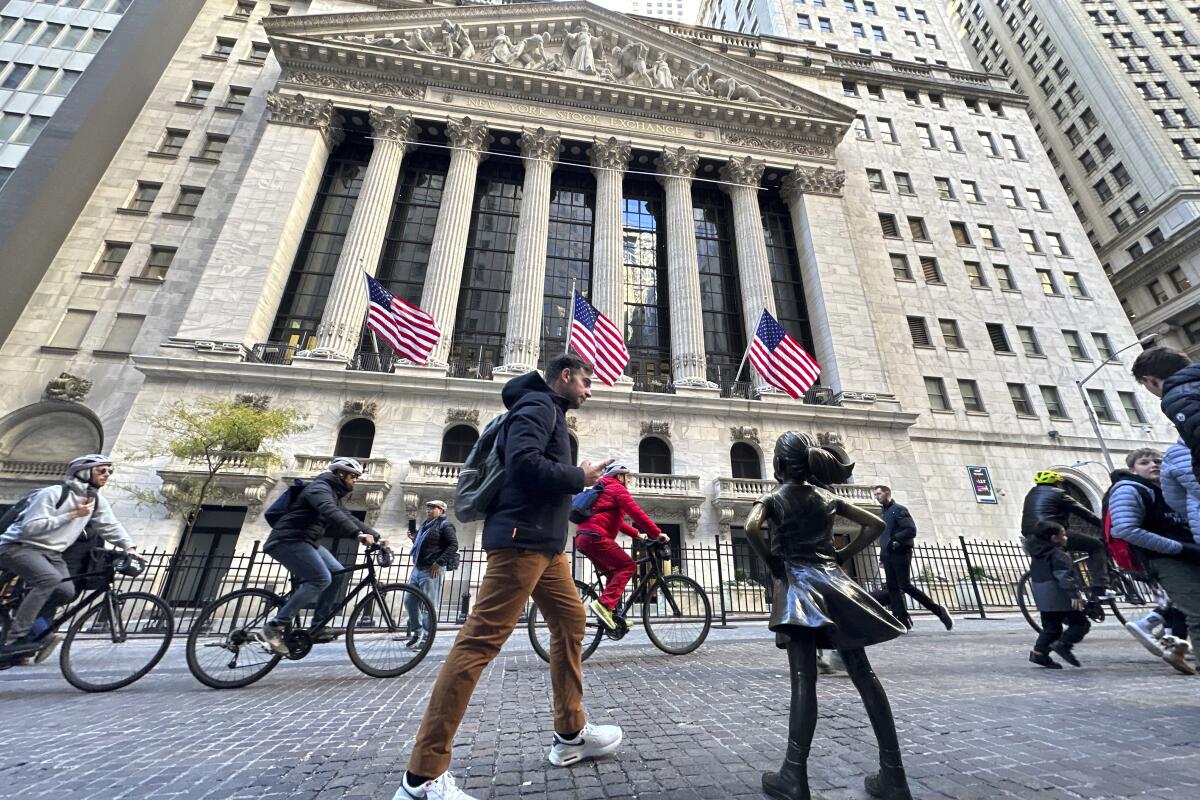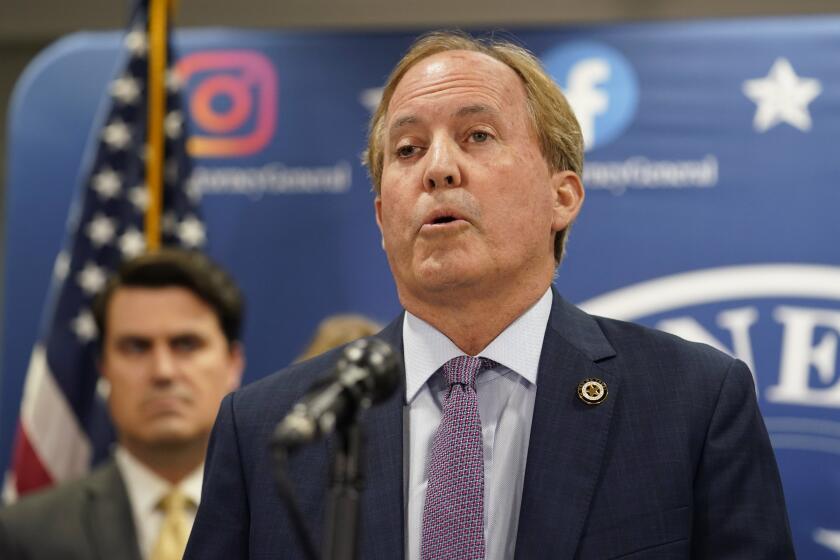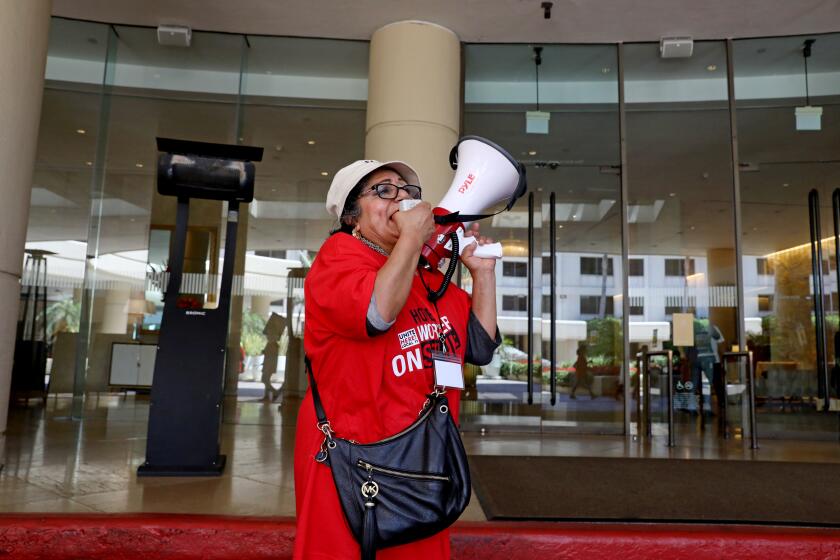Wall Street slips as tumbling crude oil prices drag down energy stocks

Wall Street ticked lower Wednesday after another sharp slide for the price of crude dragged down oil-and-gas stocks.
The Standard & Poor’s 500 slipped 17.84 points, or 0.4%, to 4,549.34 for its third straight loss, locking in its longest losing streak since October. Each of those drops was modest, though, and the index remains near its best level in 20 months.
The Dow Jones industrial average fell 70.13 points, or 0.2%, to 36,054.43. The Nasdaq composite lost 83.20 points, or 0.6%, to 14,146.71.
Energy stocks had the market’s worst drops by far. Halliburton sank 3.6% and Marathon Oil fell 3.5% after crude oil touched its lowest price since June.
A barrel of benchmark U.S. crude tumbled roughly 4% as expectations build that the world has too much oil available for the global economy’s demand. It sank below $70, down more than $20 since September. Brent crude, the international standard, fell 3.8% to $74.30 per barrel.
Losses for Big Tech stocks, which are some of Wall Street’s most influential, also weighed on the market. Nvidia dropped 2.3% and Microsoft lost 1%.
Helping to limit the market’s losses was a gain of 1.9% for home builder Toll Bros., which reported stronger profit for the latest quarter than analysts expected. It also said demand from buyers has remained solid so far in the current quarter, thanks in part to slightly easier rates available for mortgages.
Mortgage rates have regressed as Treasury yields have dropped on hopes that the Federal Reserve may finally be finished with its barrage of hikes to interest rates, meant to get high inflation under control. Wall Street is betting that the Fed’s next move will be to cut rates, possibly as early as March, which would boost the economy and financial markets.
More reports arrived Wednesday that bolstered those hopes. The Fed’s next meeting on interest rates is in a week, and the widespread expectation is for it to leave its main interest rate alone at its highest level in more than two decades.
A leaked document shows how Amazon cultivates support from nonprofits and politicians in its fight against environmental regulations and labor organizers in the Inland Empire.
One report said private employers added fewer jobs last month than economists expected. Although no one on Wall Street wants to see massive layoffs, a cool-down in the job market could remove upward pressure on inflation.
A more comprehensive report on the jobs market from the U.S. government will arrive Friday, one that could cause big swings on Wall Street.
“What we don’t know is how much the markets have already priced in a slowing labor market, or how they will react if Friday’s data comes in stronger than anticipated,” said Chris Larkin, managing director of trading and investing at E-Trade from Morgan Stanley.
A separate report Wednesday said U.S. businesses were able to increase the amount of goods they produced in the summer by more than the total number of hours their employees worked. That stronger-than-expected gain in productivity more than offset increases to workers’ wages, and it could also keep a lid on inflationary pressures.
Treasury yields in the bond market were generally lower after the economic reports, and the 10-year yield fell to 4.11% from 4.17% late Tuesday. It was above 5% and at its highest level since 2007 in October.
Google took its next leap in artificial intelligence Wednesday with the launch of project Gemini, an AI model trained to behave in human-like ways.
Within the S&P 500, Campbell Soup was the biggest winner and rose 7.1% after reporting stronger profit for the latest quarter than expected.
Travel-related companies were also strong as falling crude prices relieved some pressure on them. Carnival rose 5.9% and Royal Caribbean Line gained 3.4%.
Airlines also flew higher. Delta Air Lines climbed 3.5% after it told investors that it’s sticking to its forecasts for revenue and profit for the end of 2023. United Airlines rose 3.4% and Southwest Airlines gained 3%.
On the losing end of Wall Street was Brown-Forman, the company whose brands include Jack Daniels whiskey. It fell 10.4% after reporting weaker earnings than analysts had forecast. It also cut its forecast for a measure of sales growth for the full year.
Shares of British American Tobacco sank 8.4% in London after the company said it will take a noncash hit worth $31.39 billion to account for a drop in the value of its “combustible” U.S. cigarette brands. It’s moving toward a “smokeless” world, such as e-cigarettes.
Shares of Altria Group, which sells Marlboro cigarettes in the United States, fell 2.8%.
Wall Street could also be setting itself up for disappointment if cuts to rates do not come as quickly as hoped. Although Fed officials have hinted that their main interest rate may indeed be at a peak, some have said it’s too early to begin considering when cuts could come.
Texas Attorney General Ken Paxton unveils a fact-free lawsuit questioning Pfizer’s COVID vaccine, which has helped to save millions of people from hospitalization and death.
Stock markets abroad were mostly higher. Japan’s Nikkei 225 jumped 2% after a top central bank official reiterated that the Bank of Japan will keep its monetary policy easy until it achieves a stable level of inflation.
Gains were more modest across the rest of Asia and Europe.
AP writers Matt Ott and Elaine Kurtenbach contributed to this report.






